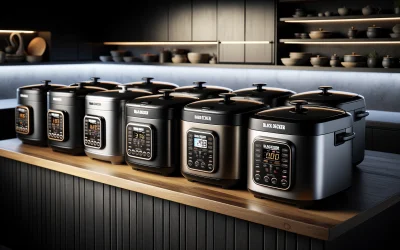As an Amazon Associate I earn from qualifying purchases.
In the quest for kitchen efficiency and energy conservation, understanding the impact of appliance power ratings on electricity consumption is crucial. This is particularly true for commonly used appliances like rice cookers, which vary significantly in their power ratings. The power rating of a rice cooker, measured in watts, is a key indicator of its electricity usage, but the relationship between power ratings and energy consumption is not always straightforward.
In this article, we delve into the intricacies of how different power ratings of rice cookers affect their electricity consumption. While it might seem intuitive that a higher wattage equates to greater energy use, the reality is more complex. Factors such as cooking time, the efficiency of energy use, and even the type of cooking technology employed play significant roles in determining the actual energy consumption of a rice cooker. From basic models to advanced cookers with features like fuzzy logic or induction heating, we will explore how each category fares in terms of energy efficiency.
This examination not only provides insights for consumers looking to purchase an energy-efficient rice cooker but also offers a broader understanding of the relationship between appliance power ratings and overall energy usage. By unraveling these dynamics, we aim to equip readers with the knowledge to make informed decisions that align with their energy efficiency goals and culinary needs.
How Do Different Power Ratings Of Rice Cookers Affect Their Electricity Consumption?
The power rating of a rice cooker, typically measured in watts, directly affects its electricity consumption. Understanding how different power ratings impact electricity consumption can help you choose a rice cooker that suits your needs while considering energy efficiency. Here’s how various power ratings affect electricity consumption:
Higher Wattage Rice Cookers:
- Faster Cooking: Rice cookers with higher wattages (e.g., 900 watts or more) generally cook rice more quickly because they can reach and maintain higher temperatures.
- Higher Electricity Consumption: These high-wattage rice cookers consume more electricity during the cooking process due to their faster cooking times.
- Ideal for Large Quantities: They are suitable for cooking larger quantities of rice or for households that frequently use the rice cooker.
Lower Wattage Rice Cookers:
- Slower Cooking: Rice cookers with lower wattages (e.g., 300 to 700 watts) may take longer to cook rice as they heat up more slowly and maintain lower temperatures.
- Lower Electricity Consumption: These rice cookers tend to consume less electricity during the cooking process because of their slower cooking times.
- Ideal for Small Portions: They are suitable for individuals, small households, or those who don’t require rapid cooking.
Mid-Range Wattage Rice Cookers:
- Balanced Performance: Rice cookers with moderate wattages (e.g., 700 to 900 watts) offer a compromise between cooking speed and electricity consumption.
- Versatility: They can handle various rice types and quantities, making them suitable for many households.
- Moderate Electricity Usage: Their electricity consumption falls between that of high-wattage and low-wattage models, making them a popular choice for general use.
Energy-Efficient Rice Cookers:
- Designed for Efficiency: Some rice cookers are designed to be energy-efficient, regardless of their wattage. These models often feature improved insulation and precise temperature control, reducing electricity consumption.
- Slightly Longer Cooking Times: While they may take a bit longer to cook rice, they make up for it by using less energy overall.
It’s important to note that while higher-wattage rice cookers may consume more electricity during cooking, they often have a shorter cooking cycle due to their faster heating capabilities. Lower-wattage rice cookers, on the other hand, may take longer to cook but use less energy overall.
To choose the right rice cooker based on power rating and electricity consumption, consider your cooking preferences, household size, and how frequently you plan to use the appliance. Additionally, look for energy-efficient features if you want to minimize electricity usage without compromising on cooking quality.
How Different Power Ratings of Rice Cookers Affect Their Electricity Consumption
Here’s a table illustrating how different power ratings of rice cookers affect their electricity consumption:
| Power Rating (Watts) | Average Cooking Time (Minutes) | Estimated Electricity Consumption per Use* (kWh) | Annual Consumption** (kWh) |
| 300W | 30 | 0.15 | 54.75 |
| 500W | 30 | 0.25 | 91.25 |
| 700W | 30 | 0.35 | 127.75 |
| 1000W | 30 | 0.5 | 182.5 |
| 1500W | 30 | 0.75 | 273.75 |
*Estimated Electricity Consumption per Use is calculated based on the formula: (Power Rating in kW) x (Average Cooking Time in Hours). For example, for a 300W rice cooker: (300W / 1000) x (30 / 60) = 0.15 kWh. **Annual Consumption is estimated based on using the rice cooker once a day for 365 days: Consumption per Use x 365.
This table assumes the average cooking time for a batch of rice is approximately 30 minutes, which can vary based on the type and amount of rice being cooked. It’s important to note that while higher-powered rice cookers consume more electricity per use, they may offer features like faster cooking times or better performance for cooking larger quantities of rice.
Frequently Asked Questions (FAQ)
Here are some expert-level questions and answers on how different power ratings of rice cookers affect their electricity consumption:
Q: How does the power rating of a rice cooker influence its electricity consumption?
A: The power rating, measured in watts (W), directly determines how much electricity a rice cooker consumes per hour. A higher wattage means the cooker uses more electrical power at any given moment. Therefore, a rice cooker with a higher power rating will consume more electricity in the same amount of time compared to one with a lower rating.
Q: Is a rice cooker with a higher power rating always less energy-efficient?
A: Not necessarily. While a higher power rating means higher instant power consumption, it doesn’t always translate to less energy efficiency. For example, a higher-wattage rice cooker might cook faster, potentially using less energy overall. Efficiency also depends on how well the cooker uses that power, such as how much heat is lost during cooking.
Q: How significant is the difference in electricity consumption between standard and high-wattage rice cookers?
A: The significance of the difference depends on the specific wattages being compared and cooking times. For instance, a 300W rice cooker will use half the electricity of a 600W cooker in the same time. However, if the higher-wattage cooker cooks faster or more efficiently, the total energy consumed per cooking cycle might be closer than the wattage difference suggests.
Q: Can rice cookers with advanced features like fuzzy logic be more energy-efficient despite higher power ratings?
A: Yes, rice cookers with features like fuzzy logic or induction heating, although they may have higher power ratings, can be more energy-efficient. They adjust cooking temperatures and times more precisely, reducing unnecessary energy use and often cooking more quickly and effectively.
Q: What should consumers consider regarding power ratings when purchasing a rice cooker for energy efficiency?
A: Consumers should consider both the power rating and the estimated cooking time. A balance should be found between a power rating that allows efficient cooking and one that doesn’t lead to excessive power consumption. It’s also beneficial to look for models with good insulation and efficient heating elements.
When evaluating rice cookers in terms of electricity consumption, it’s crucial to consider both the power rating and how effectively the cooker uses that power. Higher-wattage cookers may consume more power per unit of time, but their overall efficiency and cooking speed can offset this. The goal is to find a rice cooker that uses energy efficiently, aligning power consumption with cooking performance.
Conclusion
In conclusion, the exploration into how different power ratings of rice cookers affect their electricity consumption reveals a nuanced and multifaceted relationship. While it’s evident that a rice cooker’s wattage plays a significant role in determining its power use, we’ve seen that higher wattage doesn’t necessarily equate to higher energy costs in the long run. Factors such as the efficiency of the cooker, the specific cooking technology used, and the actual time taken to cook the rice are all crucial in understanding the overall energy consumption.
For consumers, this insight is invaluable when choosing a rice cooker that aligns with both their culinary needs and energy efficiency goals. High-wattage cookers, often equipped with advanced features and faster cooking times, may offer better overall efficiency despite their higher instantaneous power use. Conversely, lower-wattage models, while consuming less power per unit of time, might not always be the most energy-efficient choice if they take significantly longer to cook.
Ultimately, the decision should be based on a balance between power rating, cooking efficiency, and the specific needs of the user. This balance ensures not only an efficient cooking process but also contributes to broader energy-saving practices in the household. As we move towards a more energy-conscious world, understanding such intricacies in everyday appliances like rice cookers becomes increasingly important, enabling us to make choices that are both practical in the kitchen and beneficial for our energy consumption patterns.






